Jack Fruit Diseases
Jack Fruit Diseases
Soft rot or fruit rot
Disease symptoms:
- Young fruits and male inflorescences are badly attacked by the
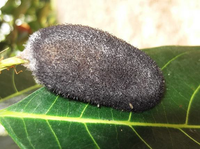 fungus and only a small percentage of the fruits reach maturity.
fungus and only a small percentage of the fruits reach maturity. - Female inflorescence and matured fruits are not usually attacked.
- The disease is a soft rot. A large number of the affected fruits falls off early. In the first stage of attack ·the fungus appears as greyish growth with abundant mycelia which gradually becomes denser forming a black growth.
Survival and spread:
- The fungus gradually advances until the whole fruit or the entire inflorescence rots and falls off.
Favourable conditions:
- Warm, humid, rainy conditions favour the development of rot. Wind, rain and insects dislodge and spread the tiny
Dieback
Disease symptoms:
- The most of die-back becomes evident by discolouration and
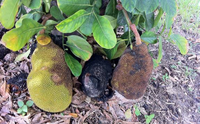 darkening of the bark some distance from the tip.
darkening of the bark some distance from the tip. - The dark area advances and young green twigs start withering first at the base and then extending outwards along the veins of leaf edges.
- The affected leaves turn brown and their margins roll upwards.
- At this stage, the twig or branch dies, shrivels and falls.
- There may be exudation of gum from affected branches. Such branches are often affected by shoot borers.
- Infected twigs show internal discolouration
Survival and spread:
- Infected twigs may cause the spreading of die back
Favourable conditions:
- Relative humidity above 80 percent and temperature of 25-31°C and rains
Leaf spot
Disease symptoms:
- Produces dark brick red spots on both the surface of leaf which
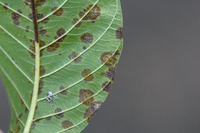 upon maturity become greyish studed with dark colour, pin headed fruiting bodies of the fungus.
upon maturity become greyish studed with dark colour, pin headed fruiting bodies of the fungus.
Survival and spread:
- The fungus overwinters on old leaves . Young rapidly expanding leaves are infected.
Favourable conditions:
- Temperature of 25°C and Relative Humidity 95-97%
Rust
Disease symptoms:
- Rust generally develops late in the summer, and in years when
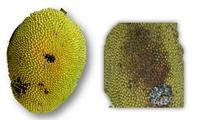 disease is severe, it can cause the trees to defoliate in a matter of a few weeks. If this happens on a regular basis, the overall growth of the trees can be reduced and yields can be affected.
disease is severe, it can cause the trees to defoliate in a matter of a few weeks. If this happens on a regular basis, the overall growth of the trees can be reduced and yields can be affected. - Another consequence of defoliation is that if it occurs early in the summer, the trees will put out new growth that is then at risk of being damaged by early frosts. On the other hand, if defoliation occurs in the fall, the trees may go dormant earlier than usual, which then protects them from early frosts.
- Initially, symptoms of fig rust are visible as small, yellowish spots on the upper surface of the leaves. As these spots (or lesions) grow larger, they turn a reddish-brown color but remain relatively smooth.
- On the lower surface of the leaf, the lesions are a reddish-brown color and have a slightly raised, blister-like appearance. Heavily infected leaves often turn yellow or brown, particular y around the edges, and drop prematurely.
Survival and spread:
- The fungus mainly survives through teliospores (thick walled, resting spores) on leaves left in the orchard or on the soil surface.
- The disease spreads by wind-borne uredospores from infected tree.
Favourable conditions:
- Temperature ranging from 25.5 to 30.5° C with relative humidity of 86-92°c favours high intensity of rust.
Pink disease
Disease symptoms
- It is widespread in tropical and subtropical areas.
- Disease appears as a pinkish powdery coating on the stem.
- Pink colour represents profuse conidial production of fungus.
- Young woody branches of the affected trees lose their leaves & show die back symptoms.
- Pink encrustation is seen on the lower shaded side.
Disease cycle
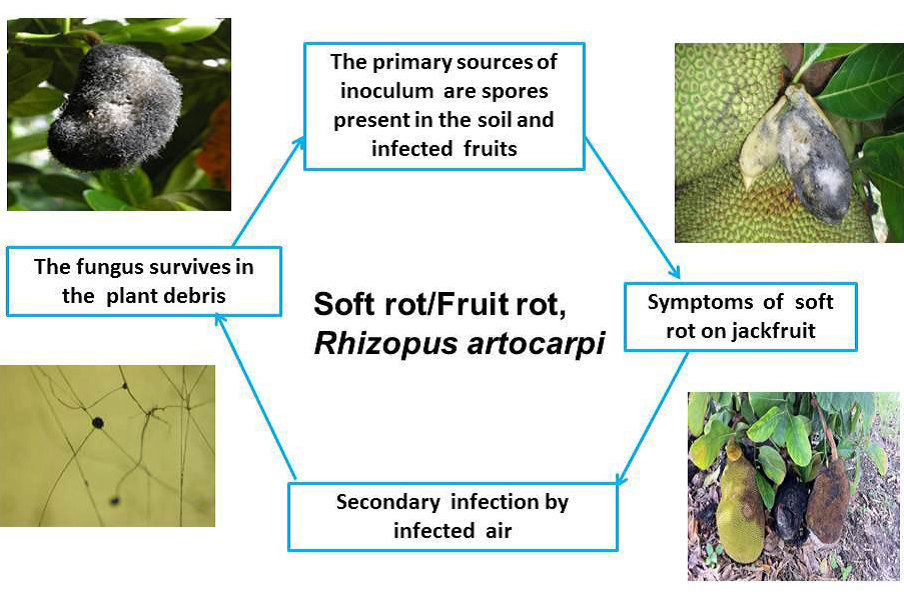
IPM for Jackfruit
To know the IPM practices for Jackfruit, click here.
Source: NIPHM; Directorate of Plant Protection, Quarantine & Storage
Last Modified : 2/11/2021
© C–DAC.All content appearing on the vikaspedia portal is through collaborative effort of vikaspedia and its partners.We encourage you to use and share the content in a respectful and fair manner. Please leave all source links intact and adhere to applicable copyright and intellectual property guidelines and laws.
RELATED ITEMS
Grapes: Diseases and Symptoms
This topic covers the Information related to Disea...
Fig Diseases
This topic covers information about Fig Diseases.
Fenugreek Diseases
This topic covers information about Fenugreek Dis...
Blackgram & Greengram: Diseases and Symptoms
This topic covers the Information related to Disea...
